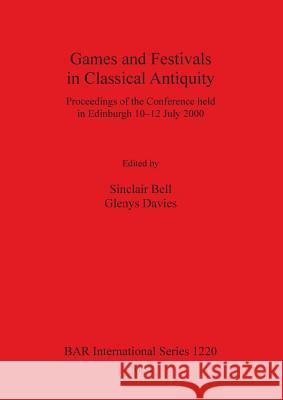Games and Festivals in Classical Antiquity » książka
Games and Festivals in Classical Antiquity
ISBN-13: 9781841715803 / Angielski / Miękka / 2004 / 153 str.
The 14 papers in this volume are taken from a conference held in Edinburgh in 2004. When the organisers called for papers for a conference on Games and Festivals they had no idea the response would be so varied--ranging from Minoan bull leaping to Samoan kilikiti--or that the papers would turn out to be so thematically interrelated. The response has shown that it is not so much the mechanics of the games or the actions carried out at ancient festivals that fascinate modern scholars as their social and political significance and the way the theme could be manipulated by writers and artists. Games and festivals were at the heart of Classical societies, playing a much more important role than in modern western societies (even taking football into account). Festivals structured the year and were inextricably bound up with the structures of society. Games and festivals are also closely linked, as most competitive games took place at a festival, or at least in a religious context, even, it seems, cock fighting and dicing, and many festivals contained elements of competition. Competitiveness pervades Greek and Roman life--and this is reflected in literature and art. In this, an Olympic year, a new selection of papers on Classical games and festivals is especially welcome.
The 14 papers in this volume are taken from a conference held in Edinburgh in 2004. When the organisers called for papers for a conference on Games and Festivals they had no idea the response would be so varied—ranging from Minoan bull leaping to Samoan kilikiti—or that the papers would turn out to be so thematically interrelated. The response has shown that it is not so much the mechanics of the games or the actions carried out at ancient festivals that fascinate modern scholars as their social and political significance and the way the theme could be manipulated by writers and artists. Games and festivals were at the heart of Classical societies, playing a much more important role than in modern western societies (even taking football into account). Festivals structured the year and were inextricably bound up with the structures of society. Games and festivals are also closely linked, as most competitive games took place at a festival, or at least in a religious context, even, it seems, cock fighting and dicing, and many festivals contained elements of competition. Competitiveness pervades Greek and Roman life—and this is reflected in literature and art. In this, an Olympic year, a new selection of papers on Classical games and festivals is especially welcome.











